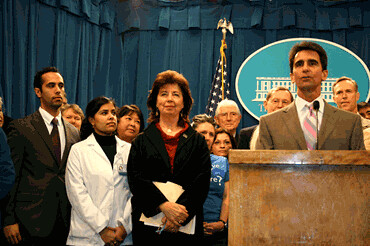While thousands of activists step up efforts to make single payer a part of the national debate on healthcare reform, similar efforts are underway in many state capitals as well.
With a dual purpose. Single payer might end up enacted in a few states first, then spread like a prairie fire across the nation — the approach that worked for Canada. And the grassroots campaigns in states should reinforce the national push.
California is a case in point. Twice in the last few years, a single payer, Medicare for all style bill has passed the state legislature, only to be vetoed by the insurance companies’ ever loyal Gov. Arnold Schwarzenegger.
But the campaign to pass the bills has brought together dozens of healthcare, labor, and community organizations across California who have subsequently become a central component of national coalitions for single payer, and an impressive army of activists who have made their voices heard on healthcare.
Just ask the insurance trade lobby association which hosted a national convention in San Francisco last June, only to be greeted by 3,000 people surrounding the conference center and resonating it with chants that were heard throughout the conference hall.
Fast forward to today, and the re-introduction of a single payer bill in Sacramento in a press conference jammed with dozens of nurses, health care activists, doctors, medical students, union members, seniors, and many others.
As bill author State Sen. Mark Leno of San Francisco, put it, the new bill, SB 810, “is not just legislation. It’s one of the fastest growing social movements in California.”
California State Sen. Mark Leno with California Nurses Association/NNOC Executive Director Rose Ann DeMoro to his right and community activists at Sacramento press conference.
Despite the political pragmatists or cynical policy wonks or legislators who have tried to shut single payer out of the healthcare reform debate, the movement itself has taken on a life of its own.
“We’re not going away — and our ranks are building,” said Rose Ann DeMoro, executive director of the California Nurses Association/National Nurses Organizing Committee, principal sponsor of the bill, said at the press conference.
Among the many others represented were the California School Employees Association, One Care Now (a coalition of many other community and senior groups), Los Angeles Unified School District, California Physicians Alliance, medical students, and about a dozen other legislators.
“What we are doing here will influence and impact the debate nationally,” Leno pointed out, adding that it just might be passed in California — or any number of other states — first.
And he used a national example, the banking meltdown, to emphasize part of the argument for the single payer. “In health care, it is the industry who decides who they will insure and who takes the profit, and we the public who take all the risk. Just as in the banking system, the private banks took the profits, and now we the public are taking the risk.
Anticipating the expected opposition of Schwarzenegger again, Leno noted, “we intend to keep the debate alive through the facts” of the bill, place it on the governor’s desk again, said Leno, and, if needed, “work hard to elect a governor in 2010 who will sign our bill.”
SB 810 is an successor to SB 840, the single payer valiantly carried for years by now retired State Sen. Sheila Kuehl. From both a health care policy and economic perspective the bill is more critical than ever.
As if any more reminders were needed, one came with a Gallup-Healthways Well-Being Index survey reported today in USA Today which found that 21 percent of Americans have difficulty paying for needed medical care or medications, with great disparities based on race and class. And the numbers facing that financial stress grew rapidly in 2008. http://www.usatoday.com/news/h…
Single payer remains the most cost-effective, comprehensive way to fix the broken system.
Cost effective by removing the bloated private insurers with their high administrative costs and financial incentives to continually raise premiums, co-pays, deductibles, and other fees that are the primary cause of rising costs.
Comprehensive in guaranteeing choice of provider, all you lose is your claims adjustor and utilization review team blocking care recommended by your doctor.
And, as a CNA/NNOC study has demonstrated, DeMoro added, single payer “not only saves lives and people’s health, it is also an economic stimulus.”
Nationally, the study found, implementation of a single payer system would create 2.6 million new jobs, infuse $317 billion in new business and public revenues, and inject another $100 billion in wages into the U.S. economy. The jobs, through increased spending on health care delivery, ripple through the economy, creating employment in retail, manufacturing, and other sectors in addition to healthcare. But in healthcare alone, DeMoro noted, the impact would be especially great in California where an estimated 15 percent of the new jobs would be generated. http://www.calnurses.org/resea…
A large part of the task of the coalition, several emphasized, is public education. The campaign has begun.

